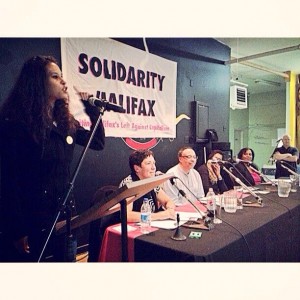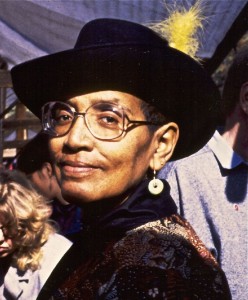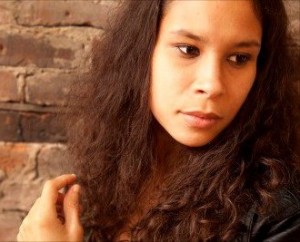Personal is Political: Speaking Power to Truth: Conversations With Sisters Around Audre Lorde
By El Jones
“I was going to die, sooner or later, whether or not I had even spoken myself. My silences had not protected me. Your silences will not protect you…. What are the words you do not yet have? What are the tyrannies you swallow day by day and attempt to make your own, until you will sicken and die of them, still in silence? We have been socialized to respect fear more than our own need for language.”
I began to ask each time: “What’s the worst that could happen to me if I tell this truth?” Unlike women in other countries, our breaking silence is unlikely to have us jailed, “disappeared” or run off the road at night. Our speaking out will irritate some people, get us called bitchy or hypersensitive and disrupt some dinner parties. And then our speaking out will permit other women to speak, until laws are changed and lives are saved and the world is altered forever.” ~ Audre Lorde, The Cancer Journals
I cry to a sister, people think I’m a bitch. I tell her how hard I feel I work, how much I do, but because I am “angry,” because I am outspoken, “everyone thinks I’m a bitch,” I say. We are always expected to prove all the ways we are not the “angry Black bitch.” No matter what else we do, the one time we “call someone out” because of racist or oppressive behaviour; the one time we refuse to smile; and no matter how gently, how patiently we suggest our real experiences or phrase our objections, we will immediately become the “bitch.” What should be the strongest part of us is turned on us to cause us unimaginable pain.
I realized once that so much of the work I do is done out of fear: out of the feeling that if I don’t give all my time, if I don’t sacrifice myself, then I will have nothing in my defense. I need to have a resume of “good” actions to point to so that I can remind people I am a good person. I am surrounded by other Black women working or who have worked themselves to death. We are scared that the one time we say no, the one time we don’t return the call, or forget, or make ourselves unavailable, then all people will say about us is how “bitchy” we are.
“Be the bitch,” my friend tells me. “The bitch protects you.”
I am not trying to reclaim the word “bitch.” What I have learned is that what is called “bitchy” in Black women is our power. I am reclaiming that. So often the word is levelled at Black women who dare to speak. When we can overcome our fear of being “the bitch” we begin to recognize all the words buried inside us that were protecting us and supporting us all along. What are the words you do not yet have because you have been cutting off yourself at the root?
Audre tells us that silence will kill us. This is not a metaphor. Studies show us that our high rates of blood pressure and heart disease are solely attributable to “higher rates of stress.” What they mean is that racism is deadly. I once read an interview with Jackie Robinson’s widow. She said that the only reason for Jackie dying early of a heart attack was all the racist abuse he had to swallow year after year and never say anything. The words he kept inside literally stopped up his heart. Audre tells us, if we do not let our words out they will come out anyway and punch us on the inside of our mouths. As Black women we recognize the need to claim the beauty of our bodies. We must also claim the beauty of our words. Racism has conditioned our relationship with our own language. We need to teach ourselves to stop being afraid of speaking out, to love and nurture our words not matter how angry and “ugly” they feel. The image of the Black woman “going off” is used to shame and silence Black women, and when our words come out violently anyway, used to invalidate what it is we are saying: our outcry against oppression. When our words come violently we should cherish them, not force them back inside us, and in doing so learn to transform them.
For a long time, I felt that the thing in me that drove me to speak out was something outside of me, like a force that took control of me and drove me unwilling to open my mouth. Another sister shares with me the same thought, that for many years she felt that the thing that compelled her to have her say was not a part of her. She literally personified this force, as though it were another, demonic (“bitchy”) woman inside her. This sister has suffered real trauma as a result of speaking her truths. In tears she tells me, I have had to learn to accept that it is me, it’s not some outside force. I am choosing to speak, I am this voice, this other woman is me, and I have to embrace her.
I have learned to recognize that abuse is not only committed upon the bodies of Black women. Having our speech undermined is violence. It does real spiritual and emotional damage to us. Being made to feel crazy is an abuse. I once shared a poem with a sister about Harriet Tubman. In it I tell about how Harriet had a dent in her skull from when her mistress threw an iron weight at her head. Later I shared about an experience I had performing poetry where I was attacked and marginalized by a white man, and people told me I deserved it because I wrote and performed poetry that made white people uncomfortable. I shared that my pain was not even most acutely felt by the original attacker, but by the fact that many I had trusted and considered comrades remained silent. This sister responded, “That is like the iron to the head.” Because we often suffer so much physical abuse as Black women, we are trained to think the damage done to ourselves by the constant denial, diminishment and dismissal of our words is inconsequential. Audre powerfully reconnects us to the sense of language inside us. Our language is our self. We sicken and die if we do not feed her with our words.
This is the second thing I have learned. I think about the language ripped from the throats of our great, great, great grandmothers. I often think about what it cost liberated slaves to stand up in halls full of white people day after day and lay bare their trauma for the audience. I think how they did it regardless to save their people. What courage they had. I think about the silence of our grandmothers and the compromises of our mothers. I remember how our ancestors not only spoke in the language forced upon them but created. I think about the sister who, when I ask her how she is always replying, “I’m alive. And I’m not supposed to be.” I think about how every word uttered by a Black woman is an act of resistance, of survival. I think of all the time I have spent suppressing words, swallowing them down, being ashamed and guilty about all the things that were in me that were too passionate, or too angry, or “too Black.” I think of the love shone on and through me by all these countless, often nameless, women of our ancestry and I allow them to guide me to speak. It is not “bitchiness” that rises in me. It is my commitment to them, and them to me joined together in claiming the power to speak. This is what Audre means to me, how she has unstopped my throat and tongue, how when I wished to be anything other than what I am Audre spoke to me. Audre gave me the permission to be the Black woman I am, to embrace and accept the so-called “bitch,” which is really the goddess, inside.
I call her St. Audre, I say to a sister. I am not joking. St. Audre because no matter what I am going through, Audre is there for me.
_________________________________________
El Jones is the Halifax Poet Laureate in Nova Scotia, Canada. She is guided by the courage of Audre who came before, and cupped in the hands of African Nova Scotia. She teaches in the Women’s and Gender Studies department at Acadia and in the African Canadian Transition Program at the Nova Scotia Community College. She was the two-time captain of the back-to-back national championship Halifax slam team in 2007 and 2008. El has performed all over Canada, including at the 10th Anniversary All-Star edition of When Sisters Speak in Toronto. In 2012, she was sponsored by Citizenship and Heritage Canada on a reading tour of Nova Scotia with George Elliott Clarke. Her poetry is particularly committed to political causes and social justice and has worked extensively with organizations around Halifax performing and presenting on issues of social change. She is dedicated to using poetry in prison outreach and youth engagement, and volunteers twice a week at Centerline Studio on the corner of Uniacke and Gottingen. El is current artistic director of Word Iz Bond Spoken Word Artist Collective and can be seen performing on the third Thursday of every month at the Company House at 2202 Gottingen Street in Word Iz Bond’s SPEAK! series, one of the oldest continually running spoken word series in Canada. She currently teaches in the African Canadian Transition Program at NSCC and in the Women’s Studies program at Acadia. El believes that poetry can empower the powerless and give voice to the voiceless. Her collection of spoken word, “Live from the Afrikan Resistance!,” is being released this fall by Roseway Press.







Pingback: Afterword: Standing at the Lordean Shoreline - The Feminist Wire | The Feminist Wire